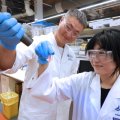University of Queensland researchers have been part of a major breakthrough in understanding the cause of the debilitating arthritic condition ankylosing spondylitis (AS).
The research, led by Professor Matt Brown from UQ’s Diamantina Institute for Cancer Immunology and Metabolic Medicine, has identified susceptibility genes for AS, which is a type of inflammatory arthritis that targets the joints of the spine.
“The identification of these AS genes extends our understanding of this disorder and provides an important foundation for future research into this common and debilitating condition,” Professor Brown said.
“Through similar work done in the past, we have identified two potential therapeutic targets and one of them is about to have trials in response to in Europe.”
He said his lab was the lead genetics centre of the international consortium which performed the study. Other main participants included Professor John Reveille’s team from the University of Texas (Houston) and Professor Paul Wordsworth’s team form the University of Oxford.
“This is a real testament to the quality of the research we conduct at the Diamantina Institute,” he said.
Professor Brown said the next step of the research, which was recently published in Nature Genetics, was to identify more of the genes associated with the disease.
“At the moment we probably have only identified only half of the genetic risk of the disease,” he said.
“We really want to work out the basic mechanisms by which the abnormalities in the genes lead to the disease.
He said the work had also led them to identify similarities between the genes that cause AS and those involved in inflammatory bowel diseases and psoriasis. In combination these conditions affect about three percent of Australians.
Media: Professor Matt Brown (07 3240 2870, 0421 588 581).
.jpg)











